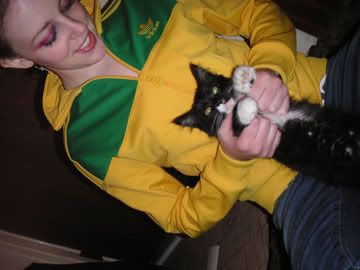Hi. It's been a while.
After reading Galapagos, I set off to read some short stories. I read "Colony" by Philip K. Dick (awesome!) but then I had enough. If I am trying to read a load of books and write about them, reading short stories is antithetical.
On to a review: my first experience of reading Chuck Palahniuk wasn't bad, but it didn't help me understand why so many people enjoy his work. That was Choke (which, BTW, the film comes out next month). I really had to understand the hype, so I read Lullaby last week. Verdict: much better.
I hate saying this, but as a person with, you know, teaching as a profession, literature should say something. It ought to mean more than just a simple story. Now, I could make up a meaning for anything, but that's not the point. It should be obvious enough that any person reading can see a hint of meaning. Maybe not "get" the whole thing, but be able to say, "Yeah, I think this book is about _______" (insert theme here).
That was my main problem with Choke, that I wasn't sure what Palahniuk was doing with it besides shocking us. But that's fine! Whatever, moving along. Reading Jezebel the other day, some commenter made a snide remark about how Palahniuk is a hack who can't string together a literate sentence. I don't know what is going on with that bitter reader, but even if you don't like his style, he's definitely got one. His voice is strong, identifiable, and his. It is definitely literate and literary. That's what I recognized with Lullaby... his stories are outrageous, but there is something comforting about them. If Chuck were my uncle, I would hear these tales at family gatherings and never be disturbed—"that's good ol' Uncle Chuck."
Lullaby would be a great read for those into folklore. It centers on a culling song, a poem that read, spoken, or even thought brings instant death. Not to the reader/speaker, but to whomever they read it to or who they think about. So, this likely started as an oral tradition and then got transcribed and ended up in The Book of Shadows. I'm surprised I haven't heard people bring this little tale up in Folklore class and pretend they heard it from someone. But that's a digression.
Carl read this song to his wife and young daughter, accidentally killing them. He fled, and is now an incredibly guilt-wracked newspaper reporter focused on a series of articles about Crib Death. Hits a little close to home, huh?
Unfortunately 500 copies of the book with this culling poem were printed. It becomes his job, with the help of a realtor, to track these books down and destroy page 27.
So, awesome premise. It's a great story, and it doesn't shock quite as much as Choke. That's not to say it's sterile, sanitary, or something you'd want your grandmother to read. It's just a little more reserved...
One conflict of the novel is the power that comes from the culling song. In the wrong hands, it could mean genocide. But even in careful hands, it causes a string of deaths. So what do you do with it? Use it selectively? Kill yourself so you can't wreak havoc? Carl's realtor friend, Helen, believes you should aim at constructive deconstruction: she uses the poem as her weapon for her side-job as a hitwoman.
But, if you know of the power of this poem, do you have responsibility to destroy it so innocent people are spared? Not only do countless infants die because of it, but their parents are punished (by guilt, or the law).
Or, as Oyster, the young hippie/anarchist/Eugene-resident-at-heart wants, you could use it to shake up the world's balance of power. Maybe kill all of the CEOs, world leaders and child molesters? Make yourself Adam and your girlfriend Eve?
This is just one conflict the poem presents: power. What about control? In trying to destroy an evil force, the characters could spur an ugly control of all people read, hear, speak, etc. What happens if the World's citizens realize books are dangerous, and that they can kill? Do we destroy all literature? (I bet The Anarchist's Cookbook is the first to go). If not, who decides what goes?
And there's so much more. Like I've done before, I'm cutting myself off. Go read this book.
KK
Subscribe to:
Post Comments (Atom)

No comments:
Post a Comment